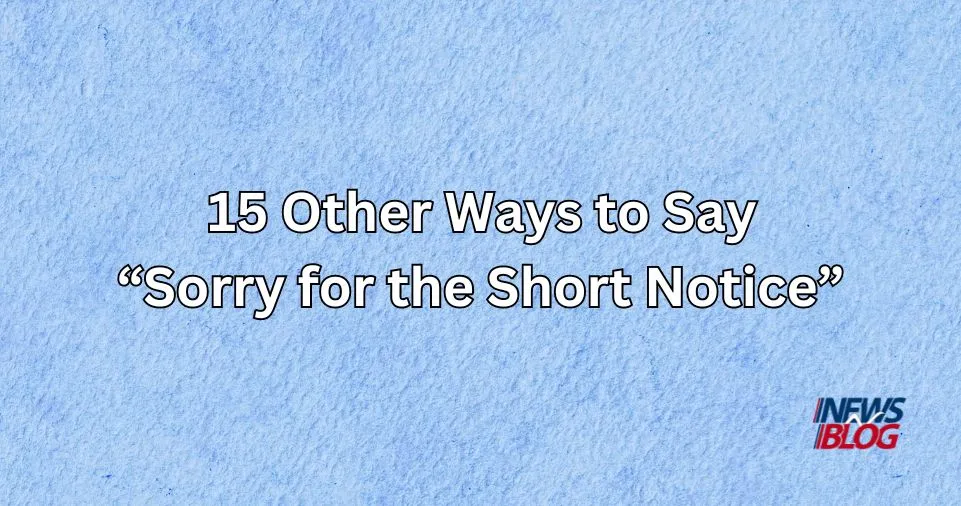In today’s fast-paced world, you often need to communicate important information quickly.
Learning how to apologize for short notice in emails is essential to maintaining positive professional relationships.
This article provides 15 alternative ways to say “Sorry for the Short Notice“, offering scenarios and insights to guide you in various situations.
Table of Contents
What You’ll Learn from This Article
This article will help you understand how to express apologies for short notice in emails, providing you with a variety of phrases to convey sincerity, regret, and appreciation.
You will also learn how to adjust your tone to different situations, encouraging understanding and cooperation from recipients.
Is Saying “Safe Travels” Considered Professional?
Wishing someone “Safe travels” is considered professional and can be a courteous addition to an email when appropriate.
It shows that you care about the recipient’s well-being and demonstrates a personal touch in professional communication.
Pros and Cons of Expressing Short Notice in Emails:
Pros
- Clear Communication: Using diverse expressions ensures clear communication of urgency.
- Variety in Tone: Different phrases help convey sincerity, regret, and appreciation in varying tones.
- Encourages Understanding: Demonstrating awareness and seeking cooperation encourages understanding from the recipient.
Cons
- Repetition Risk: Using too many variations might risk sounding repetitive or insincere.
- Time Sensitivity: Regardless of phrasing, the fundamental challenge remains the limited time for the recipient to adjust.
- Dependency on Recipient’s Adaptability: Success relies on the recipient’s flexibility and adaptability, which may not always be guaranteed.
15 Other Ways to Say “Sorry for the Short Notice” in an Email
1. Apologies for the Late Notice
Expressing apologies for late notice is crucial when unforeseen circumstances arise.
Example:
Subject: Urgent Update Regarding Tomorrow’s Meeting
Dear David,
I hope this message finds you well. I apologize for the late notice about tomorrow’s meeting. Unfortunately, unforeseen circumstances require us to make last-minute adjustments to the agenda. I understand the inconvenience this may cause and appreciate your understanding.
Best regards,
Charles
Insight: Acknowledge the inconvenience and express appreciation to soften the impact.
2. I Know This Is Short Notice
Use this phrase to set expectations when time is limited.
Example:
Subject: Quick Turnaround Needed for Project Update
Dear David,
I know this is short notice, but I wanted to update you on the project’s progress. We’ve encountered unexpected challenges that need immediate attention. I appreciate your flexibility and understanding in this matter.
Best,
Charles
Insight: Being straightforward about the time constraint helps set clear expectations.
3. I Regret How Late This Is
Adding a personal touch can make your apology more sincere.
Example:
Subject: Change in Schedule for Friday’s Workshop
Dear David,
I regret how late this is, but we need to reschedule Friday’s workshop due to unforeseen circumstances. Your understanding in this matter is highly appreciated, and I apologize for any inconvenience caused.
Sincerely,
Charles
Insight: Using phrases like “I regret” adds a personal touch to the apology.
4. My Sincere Apologies for the Lack of Advance Notice
Demonstrating empathy for the recipient’s potential inconvenience is key.
Example:
Subject: Important Update: Venue Change for Annual Conference
Dear David,
My sincere apologies for the lack of advance notice, but we’ve had to change the venue for the upcoming annual conference. I understand this may cause inconvenience and appreciate your understanding during this transition.
Warm regards,
Charles
Insight: Expressing understanding shows empathy for the recipient’s potential inconvenience.
5. I Apologize for the Limited Time to Inform You
Acknowledging the recipient’s adaptability encourages a positive response.
Example:
Subject: Short Notice for Tomorrow’s Client Presentation
Dear David,
I apologize for the limited time to inform you, but there have been adjustments to tomorrow’s client presentation. Your adaptability in these situations is truly valued, and I appreciate your understanding.
Best regards,
Charles
Insight: Acknowledge the recipient’s adaptability to encourage a positive response.
6. Please Forgive the Last-Minute Notice
Maintaining a courteous tone can soften the impact of last-minute changes.
Example:
Subject: Last-Minute Changes to Team Building Event
Dear David,
I hope this email finds you well. Please forgive the last-minute notice, but we’ve had to make some changes to the upcoming team-building event. Your flexibility in these situations is greatly appreciated.
Kind regards,
Charles
Insight: Using polite phrases like “please forgive” maintains a courteous tone.
7. I Understand This Is Short Notice, and I Apologize
Clearly stating the urgency helps the recipient understand the situation.
Example:
Subject: Time-Sensitive Information Regarding Tomorrow’s Deadline
Dear David,
I understand this is short notice, and I sincerely apologize. Urgent information has come to light regarding tomorrow’s deadline. Your cooperation in adjusting your schedule is highly valued.
Best,
Charles
Insight: Clearly stating the urgency helps the recipient understand the situation.
8. I’m Sorry for Not Informing You Sooner
Taking responsibility for the delay shows accountability.
Example:
Subject: Update on Project Timeline
Dear David,
I’m sorry for not informing you sooner, but we need to discuss adjustments to the project timeline. Your prompt attention to this matter is greatly appreciated.
Regards,
Charles
Insight: Taking responsibility for the delay shows accountability.
9. I Regret Not Providing More Notice
Expressing regret conveys a sense of sincerity.
Example:
Subject: Changes to Next Week’s Webinar Schedule
Dear David,
I regret not providing more notice, but we’ve had to make changes to the schedule for next week’s webinar. I appreciate your understanding and flexibility in accommodating these adjustments.
Warm regards,
Charles
Insight: Expressing regret conveys a sense of sincerity.
10. I Apologize for Not Giving You More Warning
Emphasizing regret can help mitigate negative reactions.
Example:
Subject: Important Update: Shift in Project Requirements
Dear David,
I apologize for not giving you more warning, but there have been unexpected shifts in project requirements. Your understanding and cooperation during this period are invaluable.
Best,
Charles
Insight: Emphasizing regret can help mitigate negative reactions.
11. Give Me a Few Days to Learn More
Providing a clear timeline for resolution shows transparency.
Example:
Subject: Request for Extension on Deadline
Dear David,
I hope this message finds you well. I am reaching out to request an extension on the upcoming deadline. Give me a few days to learn more as there are some unforeseen challenges that require a few extra days to address. Your understanding and consideration in granting this extension would be greatly appreciated.
Warm regards,
Charles
Insight: Providing a clear timeline for resolution shows transparency.
12. Apologies for the Unexpected Timeframe
Communicating the unexpected nature of the situation is important.
Example:
Subject: Urgent: Change in Meeting Time
Dear David,
I sincerely apologize for the unexpected timeframe, but there has been a necessary adjustment to the meeting schedule. Your flexibility in accommodating this change is greatly appreciated.
Best,
Charles
Insight: Clearly communicating the unexpected nature of the situation helps the recipient understand the urgency.
13. My Sincere Apologies for the Short Warning
Acknowledging potential inconvenience helps build rapport.
Example:
Subject: Short Warning Regarding System Maintenance
Dear David,
My sincere apologies for the short warning, but we need to conduct urgent system maintenance tomorrow. I understand this may cause inconvenience and appreciate your understanding.
Warm regards,
Charles
Insight: Emphasizing the brevity of the warning shows acknowledgment of potential inconvenience.
14. I Regret the Limited Advance Notice
Emphasizing regret conveys the acknowledgment of the situation.
Example:
Subject: Limited Advance Notice for Department Meeting
Dear David,
I regret the limited advance notice, but due to unforeseen circumstances, we must reschedule the department meeting. Your understanding in this matter is highly valued.
Best regards,
Charles
Insight: Expressing regret emphasizes the acknowledgment of the situation.
15. Sorry for the Insufficient Lead Time
Highlighting urgency can prompt quick action.
Example:
Subject: Insufficient Lead Time for Training Session
Dear David,
I am sorry for the insufficient lead time, but there have been changes to the schedule for the upcoming training session. Your adaptability in these situations is truly valued.
Kind regards,
Charles
Insight: Using phrases like “insufficient lead time” communicates the urgency of the situation.
Also Read:
Conclusion
Effectively apologizing for short notice in emails is an essential skill in professional communication.
By using a variety of phrases, you can convey sincerity, regret, and appreciation, while also encouraging understanding and cooperation from recipients.
Remember to acknowledge any inconvenience, express gratitude for flexibility, and maintain a courteous tone to foster positive relationships.

